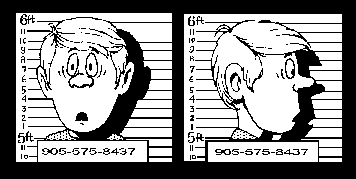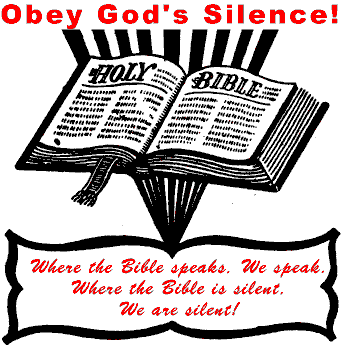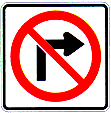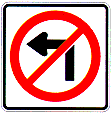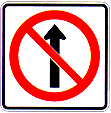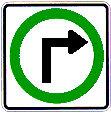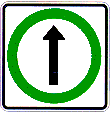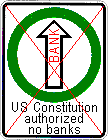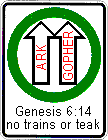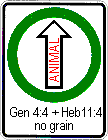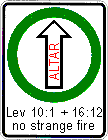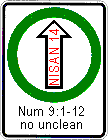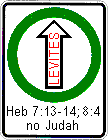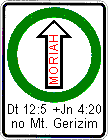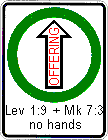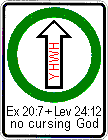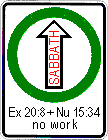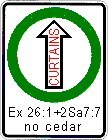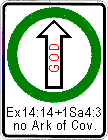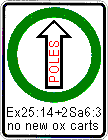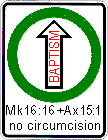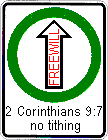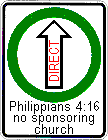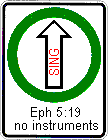Drivers Test for Christians!
|
If you drove your car the way
you interpret the Bible, would you be arrested? |
|
|
|
|
Test yourself: |
|
. .
|
|
|
|
You are a good Bible student who knows that we must obey the silence of God. If God tells you to turn left, you realize, that God doesn't have to tell you not to turn right. |
|
|
|
|
. .
|
|
|
|
You
got arrested for breaking the law. The sign means, LEFT TURN ONLY, all other
turns forbidden.
If you have a valid drivers license, your attitude towards the law is
responsible for religious division, false doctrine and heresy and are you are
one of the following: judaizer, liberal, modernist, denominationalist,
institutional (or someone who never drives a car!) because you speak where
God is silent and put words in God's mouth! |
|
|
|
|
. .
|
|
|
|
|
What does this traffic
sign mean? |
.
.
|
|
|
Traffic signs and the Bible: |
A. All agree with the meaning of these three traffic signs:
|
|
|
|
|
|
|
|
B. Only good Bible students get these three traffic signs right!
|
|
|
|
|
|
|
|
C. Bad Bible students would
be arrested for disobeying these signs:
(Judaizers, liberals, modernists, denominationalists & institutionalists)
Here is how they interpret these signs:
|
Right turn preferred, but left turn and straight not prohibited because it didn't tell me not to. I can drive anywhere I want! Sign merely suggests one of many options. |
Left turn preferred, but right turns or straight through not prohibited because it didn't tell me not to. I can drive anywhere I want! Sign merely suggests one of many options. |
Straight through preferred, but any other turns permitted because it didn't tell me not to. I can drive anywhere I want! Sign merely suggests one of many options. |
|
|
|
|
Let us now apply these
simple traffic signs to the Bible!
17 Bible traffic signs!
|
Without this sign, a National bank was prohibited. |
The US constitution did not specifically authorize the US Government to run a national bank. Jefferson said the "sign authorizing" a national bank did not exist in Constitution, and this silence must be obeyed. Alexander Hamilton argued that finding this "sign" in the constitution was not needed and a federal bank was therefore not prohibited because the constitution doesn't say we can't! Click here for more detail on the Constitutional history of the US and how it applies to Bible interpretation. |
|
Ark of Gopher wood, all else prohibited. |
God told Noah to build the ark out of Gopher wood with the exact dimensions of 300x50x30 cubits. God did not list all the woods Noah could not use, but specified the only wood he could use. Although teak is the shipbuilders wood of choice, it was prohibited! |
|
Animal sacrifice of firstlings only, all else prohibited. |
Gen 4:3-5; Heb 11:4; Matthew 23:35; Jude 11; 1 John 3:12 Although we cannot be certain why Cain's offering was rejected, it appears that had God asked for an animal sacrifice, but Cain being a farmer, would have had to ask Able for an animal. The pride that prevented him from asking Able, led to him murdering Able out of jealousy. Perhaps Cain reasoned: "God never said I couldn't offer a vegetable sacrifice. |
|
Fire only from altar, all else prohibited. |
Nadab and Abihu: "God never said we couldn't get fire for sacrifice somewhere else. Nadab and Abihu: Lev 10:1-7 were told to get the fire for the incense pan from the altar: Lev 16:12; 6:12,13; Nun 16:46. Instead they got the fire for the incense from some other place and God called it "strange fire" and killed them. The Bible calls doing that which God was silent about, was called "treating God unholy and with dishonour". Although Nadab and Abihu could have argued, "God never forbade us from taking the fire from somewhere else", God killed them for disobedience. |
|
Only the clean on Nissan 14, unclean prohibited. |
In, Ex 12:1-51, God instituted the Passover on Nisan 14 (first month, 14th day). The unclean (including those who touch the dead) were forbidden from all the feasts: Num 19:11-13. 2 Chron 30:17. In Num 9:1-12, those who were unclean by touching the dead, complained that they could not eat the Passover. They likely reasoned that they had no choice but to attend to the dead body of a loved one who died in their own home and that it was really a circumstance over which they had no control. Moses understood they had a valid point in their complaint. But rather than speaking where God was silent, Moses said, "Wait, and I will listen to what the Lord will command concerning you" Num 9:8. Now if God had never replied, Moses would not have allowed them to partake of the Passover. But God did reply, and His answer was NO! God would not permit the unclean to eat the Passover on Nisan 14 EVER! But God did create a special second Passover feast exactly one month later on Iyyar 14 (second month, 14th day). Num 9:12. Moses respected the silence of God! |
|
Only Levites are priests, all others prohibited. |
Levi, the third son of Jacob, was given no land inheritance: Joshua 18:7. Instead, they were to live off the tithe those tribes who got land of the people: Numbers 18:21-24; Heb 7:5. God traded the entire tribe of Levi for the firstborn of each tribe: Numbers 3:12-13. They were charged with the tabernacle and sacrifice and teaching God's law to the people: Deut 33:10. Jesus (of the tribe of Judah) could not be Levitical priest: Heb 7:12-14 + 8:4. Yet Jeroboam ordained non-Levites priests: 1 Ki 12:31 and the Jews had allowed a man of the tribe of Judah to be a Levite and priest: Judges 17:7,13. Although God had specifically forbidden non Levites (Num 18:22-23) it is powerful to note that the Hebrew writer doesn't argue that God forbade Judah (even though he had), but rather stated that God spoke nothing about Judah being priests. This proves that God expects men to respect His silence. God abolished the Aaronic priesthood and ordained Jesus after the "Melchizedek priesthood" Heb 7:1-11. It is not clear who paid tithes to who in Gen 14:20, "And he gave him a tenth of all." It is possible that the Jews had argued that Abram was the receiver of the tithes, not the giver. But Heb. 7:4 proves that Abraham was the lesser. |
|
Jerusalem only holy place, Mt Gerizim is not. |
Samaritans: "God never said this mountain was not holy" Deut. 12:5-7,11; 1 Kings 8:16; 1 Kings 9:3; John 4:20. God had specified Jerusalem which sat on Mt. Zion (Abraham offered Isaac on temple site: Mt. Moriah or "Jehovah-Jireh" Gen 22:1,14; 2 Chron 3:1, in Jerusalem, of King Melchizedek), as the holy place of worship for the Jews. The Samaritans were remnants of apostate Jews who were exiled to Assyria in 722 BC. A temple had been built about 350 BC on Mt Gerizim by the Samaritans and staffed with renegade and disenfranchised priests from Jerusalem. It was destroyed by John Hyrcanus about 128 BC. During the time of Christ, the Samaritans and the Jews held each other in contempt. The question about which mountain does God prefer, by the woman at the well, captures the key essence of the dispute of the two religions that share a common heritage! The Samaritans may have reasoned, that the Scriptures did not say, "Don't worship on Mount Gerizim." Historically God had pronounced the blessings of Israel from on top of Mount Gerizim in Deut 11:29; 27:11. But Jesus settled the issue siding with the Jews who had the express approval of His word! |
|
Washing of sacrifices was commanded, enforcing more is prohibited. |
Pharisees: "God never said not to require washing of cups" Mark 7:1-8. God commanded that the priests were to be washed Ex. 29:1-4 and that the legs and guts of animal sacrifices were to be washed before being sacrificed: Lev 1:9. The Jews at the time of Christ had begun to enforce the human origin tradition of washing of hands and pots before common meals in order to be holy before God. Jesus refused to be bound by this law that spoke where God was silent! The washing of hands, cups, vessels as part of worship was not commanded in their law, and thus it was wrong for them to do so. They might have reasoned, "God never said not to! Surely God is happy that we have gone to more trouble!" Jesus stated that God was not happy at all! |
|
Death to those who curse |
The third commandment was "You shall not take the name of the Lord your God in vain, for the Lord will not leave him unpunished who takes His name in vain." Exodus 20:7. In Lev 24:10-16 a teenager had cursed the name of Jehovah and they took him to Moses, because he was only 1/2 Jewish. (Egyptian father). They didn't know if they should stone the youth but, "they put him in custody so that the command of the Lord might be made clear to them" Lev 24:12. God said to stone any person who curses His name on Jewish soil! They respected the silence of God and waited for specific instructions! |
|
Death to workers on Sabbath |
In the Fourth commandment, God said that no work should be done on the Sabbath. Ex 20:8 But in Num 15:32-36 a man was caught gathering wood on the Sabbath and they took him to Moses, because they were not sure what to do to him. So "they put him in custody because it had not been declared what should be done to him." Num 15:34. God replied the man should be stoned. They respected the silence of God and waited for specific instructions! |
|
Curtains only, cedar prohibited. |
God had commanded that the tabernacle be built of curtains: Ex 26:1f ; 40:19. King David noticed that the house of cedar he lived in was much nicer than the tent of curtains God lived in (tabernacle) and wanted to build God an elaborate temple: 1 Chron 17:1-6 (2 Sam. 7:1-7) He asked Nathan the prophet about building a temple and Nathan said, "Do all that is in your heart, for God is with you." (v2) But God did not approve one bit and told Nathan in a dream that he had spoken presumptuously for God when He was silent. God said, "In all places where I have walked with all Israel, have I spoken a word with any of the judges of Israel, whom I commanded to shepherd My people, saying, 'Why have you not built for Me a house of cedar?" 1 Chron 17:6. God didn't want David to build the temple because he was a man of war and had shed blood: 1 Chron 28:3. God said that David's son Solomon would build the temple. Both God (Isa 42:13) and David were men of war and their sons built the temples. In the spectacular dual fulfillment prophecy of 2 Sam 7:12-17 (1 Chron 17:10-15) Solomon son of David, built the physical temple and Christ, Son of God, built the spiritual temple: John 2:19-21 + Eph 2:19-22. |
|
God alone is provide victory, trusting in anything else prohibited |
God had taken great effort in showing Israel that if they trusted Him, they would never lose a war with their enemies: "The Lord will fight for you while you keep silent." Ex 14:14,25; 15:3; Deut 1:30; 3:22; Josh 23:3; 2 Chron 20:29; Neh 4:20. In 1 Samuel 4:1-11, Israel was defeated by the Philistines in a war and the elders asked, "Why has the Lord defeated us today before the Philistines?" Of course the reason (in addition to practicing idolatry 1 Sam 7:3) was because they didn't trust in God to fight their battles for them. Their lack of faith was likely accelerated because of Eli the high priest who tolerated the sin of his two sons. But in 1 Sam 4:3, the elders of Israel came up with the idea, that if they physically carried the Ark of the Covenant the Philistines had captured the Ark of the Covenant with them into war, that God would be with them, and they would surely win! In v5 the people all thought this was a great idea and shouted for joy! The elders were heroes for coming up the novel idea! Of course, this violated the principle of relying on God without physical aids, and bordered on idolatry of the Ark. They were using the Ark as a "lucky charm", perhaps the first "rabbit's foot" that would guarantee victory. (Similar to Catholics today who carry around a St. Christopher's metal/medallion/scapular for safe travels.) But Israel lost a second time in a row and the Ark was captured by the Philistines in 1 Samuel 4:10. Seven months later, the Philistines returned the Ark to Israel. After "the sons of Israel removed the Baals and the Ashtaroth and served the Lord alone in 1 Sam 7:4, they never lost another battle all the days Samuel lived: 1 Sam 7:13. |
|
Levites and Poles only to move Ark, all other methods prohibited. |
In Ex 25:13-14, God had commanded that the Ark be carried with poles made of acacia wood and overlay them with gold. The sons of Kohath were to carry the Ark and no one was to actually touch it: Num 4:14-15. Later the Levites did this job: 1 Chron 15:2. After the Philistines had captured and returned that Ark to Israel in 1 Sam 6:10-11, the Levites were careful to use the poles. Then the Ark was "brought it into the house of Abinadab" 1 Sam 7:1-2, and remained there 20 years. David wanted to bring the Ark to Jerusalem, so he transported the ark of the covenant on an brand new ox cart: 1 Chron 13:7. (parallel: 2 Sam. 6:3) But the oxen almost upset the Ark on the cart and Uzzah reached out with his hands to save the Ark from falling and God killed him for touching the Ark: 1 Chron 13:9 (2 Sam. 6:6) David's initial reaction was anger at God, then fear. Incredibly it was the priests and the diviners of Dagon (1 Sam 6:2) who first came up with the idea to transport the Ark of the Covenant on a new ox cart when the returned the Ark to Israel: 1 Sam 6:7. David must have thought that if God accepted the new ox cart innovation of the pagan, God would accept it of David! Wrong! The first mistake was the new ox cart, the second was touching the Ark. Good deeds from a human perspective, don't make sin right! Later David did move the Ark to Jerusalem the God said with the poles on the shoulders of the Levite priests! 1 Chron 15:2,15. |
|
Baptism is essential to salvation, circumcision prohibited. |
Judaizers: "God never said Circumcision was no longer required." God had specifically said that water baptism by immersion for the remission of sins, was essential to salvation in Mk 16:16; Acts 2:38; 22:16; 1 Pet 3:21. Although God had commanded the Jews in the Old Testament to circumcise, he had never said, "You don't need to be circumcised to become a Christian." The Judaizers in Acts 15:1,5 were teaching that you must not only be believe and be baptized, but also circumcised to be saved! Peter's words: "To whom we gave no such commandment." Acts 15:24 There was no such commandment as circumcision in order to be saved, and thus, it was wrong. God tells us what is necessary and that rules out everything else! |
|
Free will offerings every Sunday, tithing and bake sales prohibited. |
Liberals: "God never said the church couldn't raise money from bake sales, tithing or bingo's!" Can a New Testament church go into the banking business in order to obtain funds? This was the very thing Alexander Hamilton proposed for the US federal government - that of going into the banking business. Thomas Jefferson rightly objected on grounds that there was no Constitutional provision for it. Likewise the church is only authorized to collect money from the freewill offerings of Christians every first day of the week. (1 Cor 16:1-2; 2 Cor 9:7) While the Old Testament commanded compulsory tithing 10% of your income, the New Testament actually forbids it! Instead, freewill offerings are to be made! |
|
Churches send money directly to a preacher, all else, including missionary societies and sponsoring churches are prohibited. |
Institutionalists: "God never said one church could not send money to another in evangelism and set up a sponsoring church" Although the first century church had no organization larger than the local church, institutionalists today want to use "sponsoring churches" and "missionary societies" to do the word of evangelism. In the Bible, (Phil. 4:14-16) funds for evangelism, were never sent from one church to another but always directly to a preacher. But liberal minded and institutional thinking brethren want a single local church to collect money from other churches to fund national TV and radio programs, direct mail campaigns etc. Each local church is to do their own work, under the control of the local brethren and money for evangelism must be sent directly to faithful preachers. Institutionalists will argue: "God never said one church could not send money to another in evangelism and set up a sponsoring church" |
|
God said to Sing, instrumental music prohibited. |
Denominationalists: "God never said we couldn't play an instrument in worship" Both circumcision and instrumental music were endorsed by God in the Old Testament. (Ps 150) But the New Testament Christians were commanded to sing without instruments. Eph. 5:19 Historically the early Christians did not use instrumental music from the time of the apostles until 670 AD when organs were first introduced sparingly and with great opposition. The Orthodox and Roman Catholic churches split in 1033 AD in part over instrumental music. The Orthodox church, even today, has never used instruments. No Protestant church used instruments before the 1700's. "Pope Vitalian is related to have first introduced organs into some of the churches of Western Europe about 670 but the earliest trustworthy account is that of one sent as a present by the Greek emperor Constantine Copronymus to Pepin, king of Franks in 755 AD." (American Encyclopedia, Volume 12, p. 688). "In the Greek church the organ never came into use. But after the 8th century it became more and more common in the Latin church; not without opposition from the side of the monks." (Schaff-Herzogg Encyclopedia, Vol 10, p. 657-658) "The custom of organ accompaniment did not become general among Protestants until the eighteenth century." (The New Shaff-Herzogg Encyclopedia, 1953, Vol 10, p. 257) Denominationalists today will argue, "God allowed instruments in the OT and God never forbade instruments in the NT, it must be OK." But notice this is EXACTLY the same argument the Jewish Christians were using in Acts 15 to force circumcision for salvation! |
By Steve Rudd
